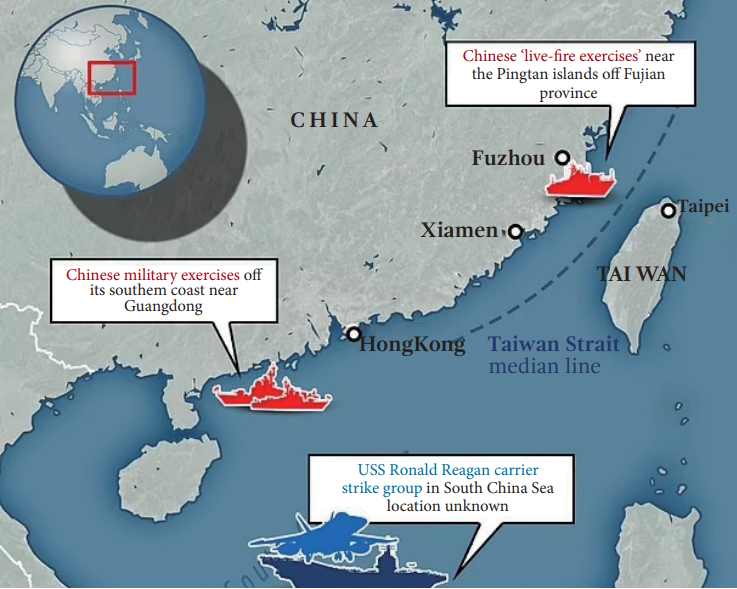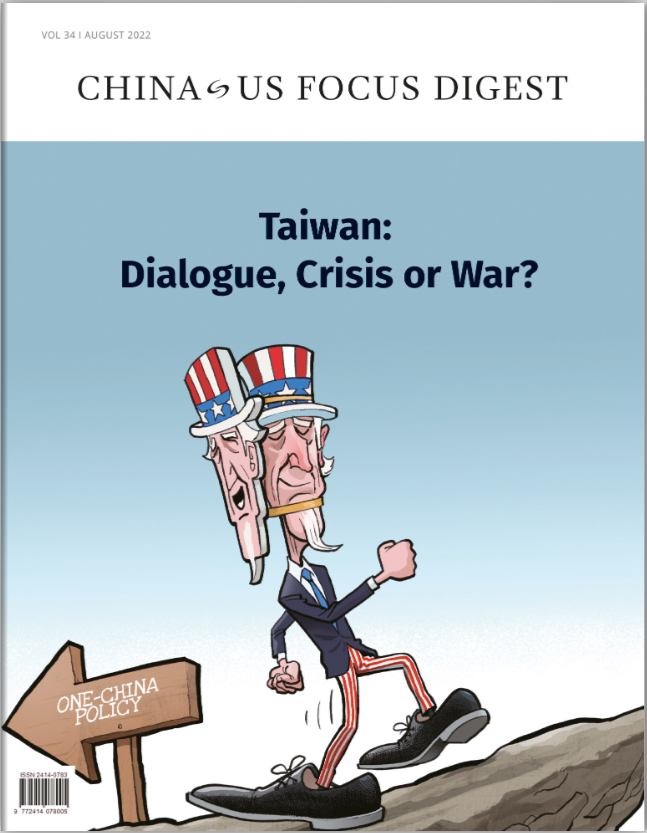Click to read the latest issue of China-US Focus Digest
The Taiwan question is a leftover from the Chinese civil war. It is purely an internal affair of China, but the United States has involved itself from the start. The recent visit by Nancy Pelosi, speaker of the U.S. House of Representatives, directly sparked a new round of tension. Democratic Progressive Party authorities on the island rely on the U.S. to back an independent Taiwan and are used to lobbying American politicians and lawmakers to visit. A high-level figure like Pelosi is naturally their favorite.
This time, however, instead of any substantive benefits to Taiwan, the visit triggered a strong backlash from the Chinese mainland in defense of sovereignty and security. The resulting days of live-fire military training was unprecedented. The DPP’' so-called opportunity for independence has proved to be a huge danger shadowing the Taiwan Strait.
For the mainland, which was unable to prevent Pelosi from going to Taiwan, the trip was enormously dangerous. Drills around the island that followed, however, have been a good opportunity to test the actual combat capabilities of the People’s Liberation Army, which is now ready to engage in similar activities on a regular basis — a potential step toward reunification.

The Chinese government has been deepening its thinking about national reunification through repeated crises. Neither changes on the island nor interventions by external forces have affected Beijing’s pace and confidence. In addition to military operations, Beijing imposed economic sanctions, suspending the import of products from more than 100 Taiwanese food manufacturers, along with citrus fruit, chilled large-head hairtail and frozen horse mackerel. It also barred the export of natural sand to Taiwan.
The mainland has always been the largest export market for Taiwan. According to the Taiwanese finance authorities, the island’s exports to the mainland (including Hong Kong) reached $188.9 billion in 2021, accounting for 42.3 percent of its total exports.
Is the mainland on the way to besieging and impoverishing Taiwan? Will the political landscape in Taiwan change under pressure? To what extent will the indifference or pain of the people of Taiwan affect the course of pro-independence forces? How many crises remain to be overcome on the road to peaceful reunification? All parties will for sure continuously assess developments and dynamically adjust their positions.
Truth mingled with falsehood
Since the establishment of diplomatic relations in 1979, China and the U.S. have experienced ups and downs over human rights, economics, trade, Taiwan, the South China Sea and more, but the overall relationship has remained stable. In recent years, as China’s overall strength grows, the U.S. has gradually come to regard China as its biggest strategic competitor. Since the Biden administration took office, competition has become the major theme of the U.S. relationship with China — at least from the American perspective.
The U.S. sees either a “competition-collaboration-confrontation” construct or frames relations as “investment-alliance-competition.” As the most important and sensitive issue central to China-U.S. relations, the Taiwan question has naturally become a card for the U.S. to use in its attempts to embarrass, irritate or enrage China.
Pelosi being the third-highest-ranking political figure in the U.S., her provocative visit to Taiwan in total disregard of China’s repeated diplomatic representations has naturally encountered more than the usual verbal condemnations that have usually followed visits by American politicians or lawmakers.
The absence of substantive acts of deterrence — which can hardly be justified to the Chinese people — cannot prevent further U.S.-Taiwan official interactions and may even trigger a “broken window effect” with various people competing to visit Taiwan. Therefore, upon Pelosi’s arrival, China immediately announced military drills in and over waters around Taiwan, sanctions on Pelosi and her immediate family members and eight countermeasures against the U.S.
Up to now, China and the U.S. seem to have a tacit understanding of restraints. China clearly stated that the military training activities would be open, transparent and professional; Biden said that he was “not worried” about those exercises. Given the domestic political agendas in both countries, given the 20th National Congress of the Communist Party of China and the November midterm elections in the U.S., the Taiwan game is expected to continue for some time, with the two sides exchanging both rhetoric and action. It may not be out of the question that U.S. warships and military aircraft, and those of its allies, may cross the Taiwan Strait again and move over China’s exclusive economic zone. In such cases, China will of course also exercise its rights in accordance with domestic and international laws and customs.
Soft and hard options
Games between major powers are increasingly complex and volatile in today’s world, with traditional and nontraditional security interwoven, given ongoing geopolitical conflicts and the COVID-19 pandemic. The Chinese government has always upheld the concept of peaceful development and increased its strength in national defense not for hegemony, expansion or spheres of influence but simply to safeguard its national sovereignty, security and development interests.
For the Chinese government, Taiwan is a core interest and there is little or no room for concessions. It naturally wants to achieve reunification by peaceful means. However, if that is not possible, leaders must make a political decision. This is why the Chinese government has never renounced the use of non-peaceful means to resolve the Taiwan question.
In developing relations with other major countries, especially the U.S., the Chinese government believes in mutual respect, peaceful coexistence, win-win cooperation and avoiding confrontation. Despite its anger over Pelosi’s visit to Taiwan, China still called on the U.S. to abide by the one-China principle and the three China-U.S. joint communiques. It expressed its hope to maintain peace and stability. It is out of this concept of peace that the Chinese government has chosen to fight the U.S. with polemics rather than military means.
The Chinese government has been committed to promoting peaceful development in the Asia Pacific region. Peace and prosperity bears no only on its own future but also on the future of the world at large. That is why no country wants a war in the Asia-Pacific. As of Aug. 5, more than 160 countries had reaffirmed their one-China policies and expressed their understanding and support for China’s actions to safeguard its sovereignty and security. China has chosen peaceful development and does not want countries to use the Taiwan Strait to provoke a conflict. It stands ready to work with other countries to safeguard security and stability in the Asia-Pacific.

